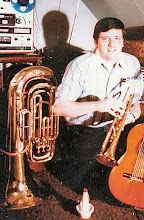

Side A:
1. Farewell Blues
2. When It's Sleepy Time Down South
3. Muskrat Ramble
4. Margie
Side B:
1. Basin Street Stomp
2. Lazy River
3. Tin Roof Blues
4. That's A Plenty
Liner Notes:
George Girard (trumpet,vocals)
Joe Rotis (trombone)
Pete Fountain (clarinet)
Roy Zimmerman (piano)
Bunny Franks (bass)
Charlie Duke (drums)
Recorded in New Orleans, September 19, 1951
Here is a Dixieland Jazz concert direct from the cradle of jazz. It is in the style Wingy Manone calls "the New Orleans drop". The traditional front line consists of 21-year-old George Girard. trumpet; 20-year-old Pete Fountain. clarinet; and 30-year-old Joe Rot is. trombone. This trio is dynamite on individual solos as well as on driving ensembles. Backing them up, we have a typical Crescent City rhythm unit. consisting of Roy Zimmerman's incisive piano that knocks off a fine ragtime solo at times, Charlie Duke's drumming. and Bunny Frank's firm string bass. This sextet from famed Basin Street is more than a mere carrying-on of a tradition during the current Dixieland revival. They are a reincarnation of one of the first great jazz bands in American music.
Thirty years ago a jazz band made up of young New Orleans musicians opened at Mike Fritzeh's Friars Inn in Chicago. They were known as the New Orleans Rhythm Kings and destined to considerably influence American dance music. Their creativeness and lack of musical inhibitions made the Friar's a music classroom for Chicago musicians. Many lessons were taken by the jazz immortal Bix Beiderbecke and his pal Hoagy Carmichael. Benny Goodman in his short pants assiduously studied the Rhythm King recordings made for the old Gennett record company. These same discs are today valuable collector's items demanding high premium prices.
History has repeated itself, for the new generation group, THE BASIN STREET SIX, have also come up the Mississippi and captured the hearts of Chicago crowds at both Jazz, Ltd.. and the Blue Note. Their hearty ensembles and striking soloists are reminiscent of the atmosphere that used to prevail when Al Jolson. Isham Jones, Al Capone, and a little chorus girl named Joan Crawford used to bounce as they listened to the New Orleans Rhythm Kings.
The personnel of both bands is predominantly made up of fun-hying youngsters full of the "hokum" traditional among New Orleans musicians.While the Rhythm Kings used to put mustard plaster on each others seats on the stand, the Basin Street Boys have channeled their excess energy into comedy acts that have proven highly entertaining to their audiences. This buoyant spirit comes through on these lively sides. The excellent solo work by Girard and Fountain is similar and reminds jazz students of their Rhythm King counterparts Paul Mares, trumpet. and Leon Rappolo, clarinet, both now passed away. Trombonist Joe Robs not only looks like George Brunis of the earlier hand but plays like him in New Orleans tailgate style.
Similarities between the two bands continue in the tunes played. Three of the most famous N.O.R.K. recordings were of the tunes Tin Roof Blues. That's A Plenty, and Farewell Blues. Here The Basin Streeters give these a going over in modern Dixie style. Pete Fountain does the fine clarinet work on Tin Roof and rivals the classic Rappolo's clarinet made of the number. Girard drives through on That's A Plenty in a like manner to the way Paul Mares did thirty years ago. Farewell Blues. now a standard number, was written by the boys in the early Rhythm King band. The Basin Street group play this tune beautifully and also do one of their own originals, Basin Street Stomp, a side that has tremendous power.
Completing the Dixieland Jazz concert herein packaged are a rousing version of Muskrat Ramble, a tantalizing Margie featuring George Girard's vocal, and a sprightly novelty run-down of the old tune Last Night On The Back Porch, with choir vocal - and finally a beautiful trumpet interpretation of Louis Armstrong's old theme song. When It's Sleepy Time Donn South. We feel this Dixieland session will go down in American music annals alongside the old N.O.R.K. Gennetts as living proof of the undying musical worthiness of pure New Orleans jazz.
- GEORGE HOEFER



No comments:
Post a Comment